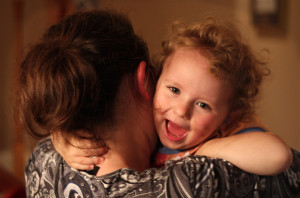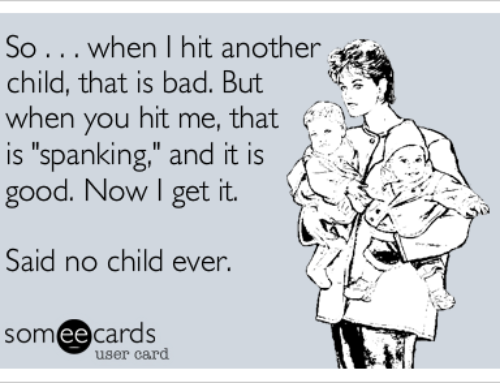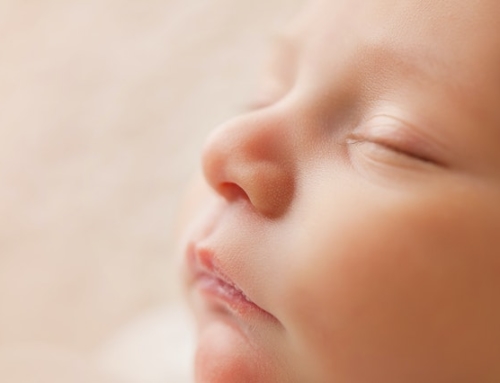 Okay, okay, it’s a kind of misleading title. Hopefully we all know how important warmth is to the parent-child relationship (or any relationship for that matter) and we make sure we are as warm as possible when it comes to raising our children. BUT… yes, the but… often people mistake warmth for responsiveness. I regularly hear the argument that people used cry-it-out (CIO) or controlled crying (CC) to get their child to not signal them at night (because you honestly can’t say they don’t wake, you just aren’t aware of it) because it allowed them to be happier and warmer during the day. I’ve also heard people justify their yelling at or hitting their children under the guise that they are generally warm parents and these warmer moments outweigh the times they screw up and lose it (and regarding discipline, I am not talking about the time your child cried because you didn’t let them have the cookie, but when you knew you lost control or were harsh in your discipline).
Okay, okay, it’s a kind of misleading title. Hopefully we all know how important warmth is to the parent-child relationship (or any relationship for that matter) and we make sure we are as warm as possible when it comes to raising our children. BUT… yes, the but… often people mistake warmth for responsiveness. I regularly hear the argument that people used cry-it-out (CIO) or controlled crying (CC) to get their child to not signal them at night (because you honestly can’t say they don’t wake, you just aren’t aware of it) because it allowed them to be happier and warmer during the day. I’ve also heard people justify their yelling at or hitting their children under the guise that they are generally warm parents and these warmer moments outweigh the times they screw up and lose it (and regarding discipline, I am not talking about the time your child cried because you didn’t let them have the cookie, but when you knew you lost control or were harsh in your discipline).
The argument is that if you have a warmer relationship at other times, the failure to be responsiveness or to even be hurtful is not a problem. Now, before I continue, let’s be clear that there are always moments in which we are not responsive or may lose it. The manner in which we handle the aftermath of these acts is critical. Communication is key and being able to express your regret and apologize to your child is paramount to negating the negative effects that may happen, especially when it comes to discipline.
Often parents don’t apologize or aim to be more responsive because they don’t feel there’s a need. They take the global view of how they parent, see that there are some negative moments, but rationalize that generally they are warm, loving parents and that the warmth they show generally will buffer their child against any negatives from the other acts or even help them reach the positive outcomes they want for them. Sadly, there seems to be evidence that this isn’t the case.
Let’s start with the case of harsh discipline. I wish I could say that it wasn’t very common, but sadly it is and there is quite a bit of evidence that greater use of harsh parenting techniques – including yelling – is associated with poorer child outcomes, like behaviour problems or anxiety
The second example that I often hear is when people engage in sleep training, or CIO techniques (including CC). I’ve gone into a lot of detail elsewhere about how these can be seen as a failure to respond to distress in the infant. I don’t think anyone argues that it’s not that (or at least I hope not), but many people argue that there would be no effects (which is silly, of course there are effects, but whether they are negative is the issue) because any negative would be outweighed by the now more positive interactions during the day. In short, because mothers are warmer during the day, the failure to respond to distress won’t matter.
The first bit of evidence that pokes a hole in this comes from Dr. Wendy Middlemiss in her groundbreaking research that found infants undergoing CIO show heightened stress responses as they fall asleep even when they no longer are crying[9]. For the purposes of warmth, however, it was another result that stood out: The cortisol synchrony between mother and infant that was present prior to sleep training (and is associated with attachment and later positive child outcomes[10][11]) was now gone. This means that mothers were no longer “in tune” with their babies as they had been before. The questions that remain, however, are if this is a long-term or short-term effect and what needs to be done to regain synchrony.
The second bit of evidence comes from the domain theory of parenting, as described by Drs. Joan Grusec and Maayan Davidov[12][13]. This theory, which has considerable support in the literature, suggests that different aspects of parenting influence different outcomes. According to the theory, parental responsiveness to distress is associated with separate outcomes than parental warmth. In practice, we know that responsiveness to distress is linked to a host of positive outcomes including greater attachment, the development of empathy, emotion regulation, etc.[13]. Important here is consistent responsiveness. When responsiveness is absent, children learn to minimize their signalling of distress, but when it is inconsistent, they learn to exaggerate it[14]. But what about warmth? Well, warmth is certainly important, but it is not linked to the same outcomes as responsiveness to distress. In a study looking at 6- to 8-year-olds[15], it was found that maternal warmth was associated to regulation of positive affect only and for boys, peer acceptance. Responsiveness to distress, however, was linked to better regulation of negative affect and children’s empathy and prosocial behaviours. This was not moderated by or in any way influenced by warmth.
So what do we have here? Well, we can cut the idea that simply being warm will make up for not responding to distress or engaging in harsh discipline. It simply won’t. Regardless of whether one believes in domain theory or not, the evidence suggests different outcomes based on different domains of parenting. Warmth is its own domain with its own set of outcomes, but they are different than those of discipline and responsiveness.
Does this mean parents have to be perfect? No. But we have to be careful about what we promote to parents. If we’re telling parents that utilizing sleep training isn’t a problem because you get to be all warm and fuzzy the next day, it’s somewhat disingenuous because the effects of that warm and fuzzy on our children are different than the effects of responding to them at night. Same with harsh discipline. But what if you’ve done this already? Are you forever stuck? No. The point of bringing this up is that the thing that will help is to change. That means that families need to have information. If they don’t have that information or we want to continue to peddle the myth that just being warm is enough for all outcomes, we don’t do any families any favours. But giving them the information means they can go forward acting in a way that benefits them and their babies because relationships can change and outcomes can change with them. And if they can’t be responsive for a period or lose their cool, they don’t have to pretend it’s fine, but just accept that we all make mistakes, apologize, and continue to move forward.
[1] Chang L, Schwartz D, Dodge KA, McBride-Chang C. Harsh parenting in relation to child emotion regulation and aggression. J Fam Psychol 2003; 17: 598-606.
[2] Crockenberg S. Predictors and correlates of anger toward and punitive control of toddlers by adolescent mothers. Child Development 1987; 58: 964-975.
[3] Brook JS, Zheng L, Whiteman M, Brook DW. Aggression in toddlers: associations with parenting and marital relations. J Gen Psychol 2001; 162: 228-241.
[4] Crockenberg S. Todderls’ reaction to maternal anger. Merrill-Palmer Quarterly 1985; 31: 361-373.
[5] Gershoff ET. Corporal punishment by parents and associated child behaviors and experiences: a meta-analytic and theoretical review. Psychological Bulletin 2002; 128: 539-579.
[6] Durrant J, Ensom R. Physical punishment of children: lessons from 20 years of research. CMAJ 2012; 184: 1373-1377.
[7] MacKenzie MJ, Nicklas E, Waldfogel J, Brooks-Gunn J. Corporal punishment and child behavioural and cognitive outcomes through 5 years of age: evidence from a contemporary urban birth cohort study. Infant and Child Development 2012; 21: 3-33.
[8] Wang M, Kenny S. Longitudinal links between fathers’ and mothers’ harsh verbal discipline and adolescents’ conduct problems and depressive symptoms. Child Development 2013; DOI: 10.1111/cdev.12143.
[9] Middlemiss W, Granger DA, Goldberg WA, Nathans L. Asynchrony of mother-infant hypothalamic-pituitary-adrenal axis activity following extinction of infant crying responses induced during the transition to sleep. Early Human Development 2012; 88: 227-32.
[10] Feldman R. From biological rhythms to social rhythms: physiological precursors of mother-infant synchrony. Developmental Psychology 2006; 42: 175-188.
[11] Feldman R. Parent-infant synchrony and the construction of shared timing: physiological precursors, developmental outcomes, and risk conditions. Journal of Child Psychology and Psychiatry 2007; 49: 329-354.
[12] Grusec JE, Davidov M. Integrating different perspectives on socialization theory and research: a domain specific approach. Child Dev 2010; 81: 687-709.
[13] Grusec JE. Socialization processes in the family: social and emotional development. Annul Rev Psychol 2011; 62: 243-69.
[14] Cassidy J, Shaver PR. Handbook of Attachment: Theory, Research, and Clinical Applications. New York: Guildford 2nd Ed. (2010).
[15] Davidov M, Grusec JE. Untangling the links of parental responsiveness to distress and warmth to child outcomes. Ch Dev 2006; 77: 44-58.






Thanks, this is really helpful and interesting to me. I didn’t sleep train either of my two children, dad or I always responded in the night and gave them the support they needed and were asking for. But man it was hard work and a long slog; many lost hours of sleep, much stress and worry and frustration in the night, no full nights sleep for 3 years. I was often tempted by this argument, I saw my struggle and tiredness in the day and wondered if I would be a much better mother if I could just get my kids to sleep more than 3-4 hours. I’m due to have baby 3 in June and am definitely nervous about the sleep aspect, though also feeling more confident because of our previous experiences. This gives me strength to stick to my resolve about nighttime parenting.
Come on, reference 9, that study is flawed, flawed, flawed and you must know it. It’s the only study AP proponents have and it is not solid. I’m not suggesting that we know the answer either way but for someone who happily picks apart other studies you have happily glossed over this one.
Its not perfect but it tells us something. More than much of anything else we have on the neurological response. But I’ve spoken of my views on it, why I reached certain conclusions, etc in other pieces. You can ignore that bit and the myth of warmth still holds.
You have discussed this in other posts, so I know it’s on your mind, but I think it’s also important to consider here parents inability to discipline gently or be responsive due to their own emotional circumstances and not just a lack of information. Though I agree lack of information is a very important piece. However, knowing the right thing to do and being able to do it consistently are two very different things – often dictated by a parent’s emotional health. Information and emotional support are both needed to improve the lives of children. And thank you for this post, I always appreciate them – you are discussing topics most “experts” avoid.
All of the research linking parental warmth and positive factors in children is correlational (because of course we can’t do randomised control studies allocating kids to warmth or no warmth conditions). This means when writers like yourself cite and discuss this research they must acknowledge that these studies don’t tell us for *sure* that parental warmth CAUSES good stuff (good emotional regulation, positve self esteem, good relationship skills etc) in kids. It is also possible that the good stuff in kids CAUSES parents to be more warm (much easier to love and be close to kids with good skills in these areas). In fact, a recent study looking at the parenting of twins showed that parents are much warmer to kids with higher prosociality and conscientousness. Using this data the researchers concluded 27% oand 48% of parenting warmth and stress (respectively) was caused by child genetic influences. Really important that this “parental warmth – child factors” research is explained precisely because it is very often glossed over and incorrect conclusions are drawn. As a psych, I get really disappointed when other psychologists don’t make this clear – i know the intent is good (how can encouraging warm parenting be bad?) but this perpetuates simplistic thinking, as well as makes parents constantly feel guilty – and this is especially true for parents of children with significantly emotional regulation difficulties (these are the families I work with). Yes, parental warmth (and responsiveness by the way) is likely to be important but contrary to the hype, we *don’t* know for sure how important this is for all children, and it may be that for some children it makes less a difference than for others.
PS: here is the reference to the study looking at child influences on parental behaviour: https://www.ncbi.nlm.nih.gov/pmc/articles/PMC6893882/
Thank you for sharing your thoughts and of course child factors influence parental behaviours; however, we have lots of evidence that it also goes the other way as well and it’s a modifiable factor that parents can work on. Warmth and responsiveness are important factors and the idea of “knowing for sure” counters the idea that we first stick with what does least harm from an evolutionary perspective.
I also urge you to be careful with your idea of causation here. The work on causality here is crucial but doesn’t negate that there are active choices parents can take to be more warm and lots of interventions that work on even just being in close proximity show improvements in warmth as well as infant temperament and parenting enjoyment. Thus parents making small changes can lead to them actually feeling happier in parenting and changes in how they perceive their child.